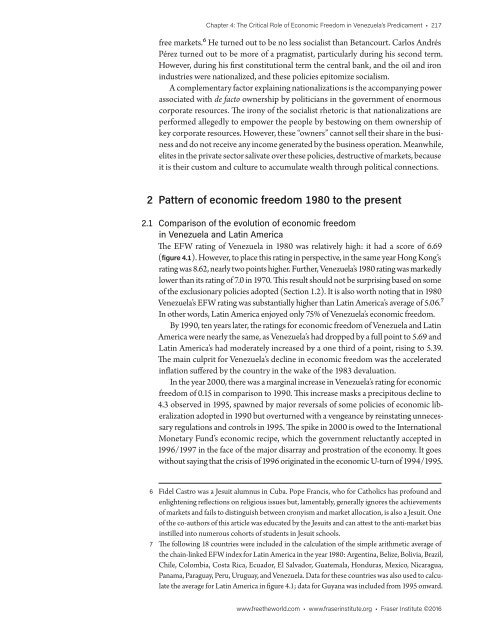Economic Freedom of the World
economic-freedom-of-the-world-2016
economic-freedom-of-the-world-2016
You also want an ePaper? Increase the reach of your titles
YUMPU automatically turns print PDFs into web optimized ePapers that Google loves.
Chapter 4: The Critical Role <strong>of</strong> <strong>Economic</strong> <strong>Freedom</strong> in Venezuela’s Predicament • 217<br />
free markets.6 He turned out to be no less socialist than Betancourt. Carlos Andrés<br />
Pérez turned out to be more <strong>of</strong> a pragmatist, particularly during his second term.<br />
However, during his first constitutional term <strong>the</strong> central bank, and <strong>the</strong> oil and iron<br />
industries were nationalized, and <strong>the</strong>se policies epitomize socialism.<br />
A complementary factor explaining nationalizations is <strong>the</strong> accompanying power<br />
associated with de facto ownership by politicians in <strong>the</strong> government <strong>of</strong> enormous<br />
corporate resources. The irony <strong>of</strong> <strong>the</strong> socialist rhetoric is that nationalizations are<br />
performed allegedly to empower <strong>the</strong> people by bestowing on <strong>the</strong>m ownership <strong>of</strong><br />
key corporate resources. However, <strong>the</strong>se “owners” cannot sell <strong>the</strong>ir share in <strong>the</strong> business<br />
and do not receive any income generated by <strong>the</strong> business operation. Meanwhile,<br />
elites in <strong>the</strong> private sector salivate over <strong>the</strong>se policies, destructive <strong>of</strong> markets, because<br />
it is <strong>the</strong>ir custom and culture to accumulate wealth through political connections.<br />
2 Pattern <strong>of</strong> economic freedom 1980 to <strong>the</strong> present<br />
2.1 Comparison <strong>of</strong> <strong>the</strong> evolution <strong>of</strong> economic freedom<br />
in Venezuela and Latin America<br />
The EFW rating <strong>of</strong> Venezuela in 1980 was relatively high: it had a score <strong>of</strong> 6.69<br />
(figure 4.1). However, to place this rating in perspective, in <strong>the</strong> same year Hong Kong’s<br />
rating was 8.62, nearly two points higher. Fur<strong>the</strong>r, Venezuela’s 1980 rating was markedly<br />
lower than its rating <strong>of</strong> 7.0 in 1970. This result should not be surprising based on some<br />
<strong>of</strong> <strong>the</strong> exclusionary policies adopted (Section 1.2). It is also worth noting that in 1980<br />
Venezuela’s EFW rating was substantially higher than Latin America’s average <strong>of</strong> 5.06.7<br />
In o<strong>the</strong>r words, Latin America enjoyed only 75% <strong>of</strong> Venezuela’s economic freedom.<br />
By 1990, ten years later, <strong>the</strong> ratings for economic freedom <strong>of</strong> Venezuela and Latin<br />
America were nearly <strong>the</strong> same, as Venezuela’s had dropped by a full point to 5.69 and<br />
Latin America’s had moderately increased by a one third <strong>of</strong> a point, rising to 5.39.<br />
The main culprit for Venezuela’s decline in economic freedom was <strong>the</strong> accelerated<br />
inflation suffered by <strong>the</strong> country in <strong>the</strong> wake <strong>of</strong> <strong>the</strong> 1983 devaluation.<br />
In <strong>the</strong> year 2000, <strong>the</strong>re was a marginal increase in Venezuela’s rating for economic<br />
freedom <strong>of</strong> 0.15 in comparison to 1990. This increase masks a precipitous decline to<br />
4.3 observed in 1995, spawned by major reversals <strong>of</strong> some policies <strong>of</strong> economic liberalization<br />
adopted in 1990 but overturned with a vengeance by reinstating unnecessary<br />
regulations and controls in 1995. The spike in 2000 is owed to <strong>the</strong> International<br />
Monetary Fund’s economic recipe, which <strong>the</strong> government reluctantly accepted in<br />
1996/1997 in <strong>the</strong> face <strong>of</strong> <strong>the</strong> major disarray and prostration <strong>of</strong> <strong>the</strong> economy. It goes<br />
without saying that <strong>the</strong> crisis <strong>of</strong> 1996 originated in <strong>the</strong> economic U-turn <strong>of</strong> 1994/1995.<br />
6 Fidel Castro was a Jesuit alumnus in Cuba. Pope Francis, who for Catholics has pr<strong>of</strong>ound and<br />
enlightening reflections on religious issues but, lamentably, generally ignores <strong>the</strong> achievements<br />
<strong>of</strong> markets and fails to distinguish between cronyism and market allocation, is also a Jesuit. One<br />
<strong>of</strong> <strong>the</strong> co-authors <strong>of</strong> this article was educated by <strong>the</strong> Jesuits and can attest to <strong>the</strong> anti-market bias<br />
instilled into numerous cohorts <strong>of</strong> students in Jesuit schools.<br />
7 The following 18 countries were included in <strong>the</strong> calculation <strong>of</strong> <strong>the</strong> simple arithmetic average <strong>of</strong><br />
<strong>the</strong> chain-linked EFW index for Latin America in <strong>the</strong> year 1980: Argentina, Belize, Bolivia, Brazil,<br />
Chile, Colombia, Costa Rica, Ecuador, El Salvador, Guatemala, Honduras, Mexico, Nicaragua,<br />
Panama, Paraguay, Peru, Uruguay, and Venezuela. Data for <strong>the</strong>se countries was also used to calculate<br />
<strong>the</strong> average for Latin America in figure 4.1; data for Guyana was included from 1995 onward.<br />
www.free<strong>the</strong>world.com • www.fraserinstitute.org • Fraser Institute ©2016


